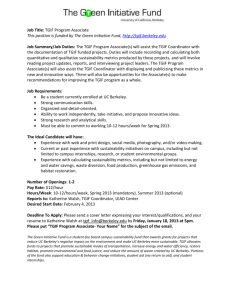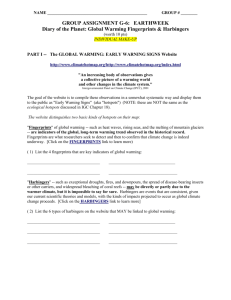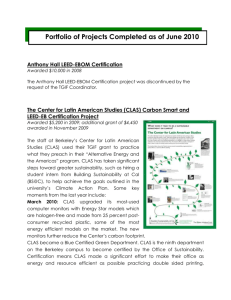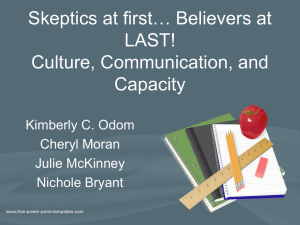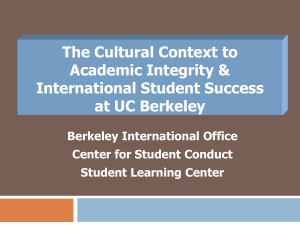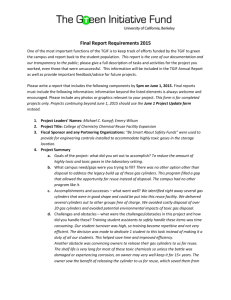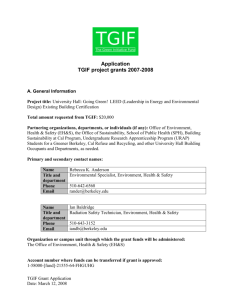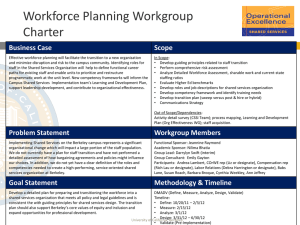2008 Application Submission
advertisement
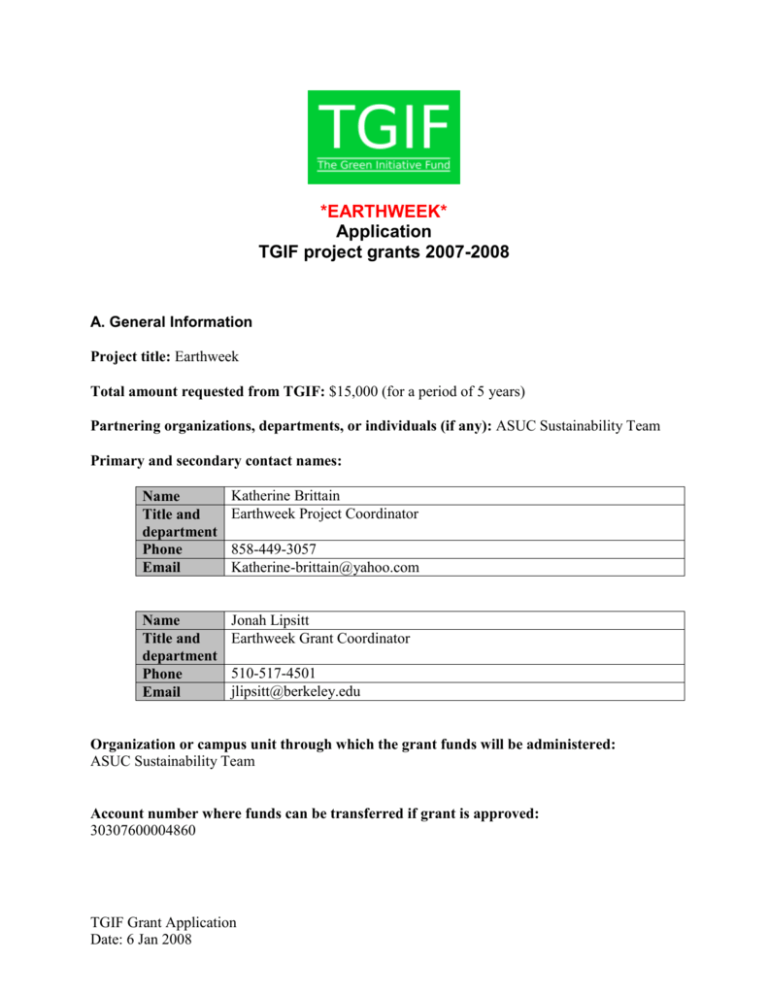
*EARTHWEEK* Application TGIF project grants 2007-2008 A. General Information Project title: Earthweek Total amount requested from TGIF: $15,000 (for a period of 5 years) Partnering organizations, departments, or individuals (if any): ASUC Sustainability Team Primary and secondary contact names: Name Title and department Phone Email Katherine Brittain Earthweek Project Coordinator Name Title and department Phone Email Jonah Lipsitt Earthweek Grant Coordinator 858-449-3057 Katherine-brittain@yahoo.com 510-517-4501 jlipsitt@berkeley.edu Organization or campus unit through which the grant funds will be administered: ASUC Sustainability Team Account number where funds can be transferred if grant is approved: 30307600004860 TGIF Grant Application Date: 6 Jan 2008 B. Project Description (The maximum total length for answers to all questions in this section is 300 words.) 1. Purpose Describe the overall purpose of your project and its key components. Overall Purpose: The purpose of Earthweek is to unite faculty, staff, students, Bay Area organizations, and other environmentally conscious groups and individuals in educating, inspiring activism, encouraging individual changes in habit (from using CFLs instead of incandescent to reducing individual carbon footprints), and overall promoting environmentalism. Key Components: In order to achieve this overarching goal we have several events planned including: -MONDAY Bay Area Resource Fair: -Ecology Center, Food First, Berkeley Organization for Animal Advocacy, Engineers for a Sustainable World, Urban Releaf, East Bay Municipal Utility District, Bay Area Air Quality Management, Greenpeace, Berkeley Worms, Redefining Progress, Rainforest Action Network, Union of Concerned Scientists -TUESDAY UC Berkeley Resource Fair: -Climate Change Education (Jim Callahan), Office of Environmental Health and Safety, Residential Sustainability Education Coordinators, TGIF, Students for a Greener Berkeley, Green Campus, CalPIRG, Society for Agriculture and Food Ecology, CalSSAN, Forestry Club, BEAN, Re-Use, CACS, Chemists for Peace, College of Natural Resources, Lawrence Berkeley National Labs, Overflyeration Committee, Student organic Gardening Association, Berkeley Roots and Shoots, BERC -WEDNESDAY Green Picnic -Phoenix Pastificio, Redwood Hill Farm, Café Zambala, Flacos, Blue Bottle, Curry Leaf Cuisine, Crepe maker, Bennett Valley Bread and Pastry, OctoberFeast, Andy and Cindy Thai Cuisine, The Local, Cal Dining, Strauss, Cliff Bar -THURSDAY Transportation Fair -California Center for Energy and Transportation, Transportation and Land Use Coalition, East Bay Bicycle Coalition, AC Transit, Carpool (Facebook), Fide Share/Flex Car/City Car Share, Berkeley Energy Alliance for Renewables Biodiesel Collective, Cal Clean Fleet (Tim Pine), City of Berkeley Energy Office, Alliance to Save Energy, Flex Your Power, Green Cars Electric Car Company, Mike's Bike's, Missing Link Bicycle Co-Op, University Athletics Critical Mass -FRIDAY Personal Initiative -Trash Audit, Green Room Tours, Solar Panel Tours, Carbon Footprint Pledge, Meditation Circle, Art for Activism display (www.arteartheachother.org), Art Miles Mural Project (http://www.the-art-miles-mural-project.org). -ALL WEEK STeam Tabling -selling Klean Kanteen, CFL exchange, selling Chico Bags, selling organic cotton Earthweek T-shirts -EVENING EVENTS: TGIF Grant Application Date: 6 Jan 2008 -Mayors Panel (including Mayor Newsom, Mayor Bates, Mayor Dellums), Governor Schwarzenegger, BP Panel (including professors, graduate students, undergraduate students, local activists) or an Alternative Fuels Panel, Film Festival (with six local films), Planet Earth Film Showing, Sustainability Workshop 2. Sustainability Goals Which aspects of campus sustainability will your project address, and why is addressing these sustainability components important? Our event is difficult in the sense that the sustainability it promotes is difficult to quantify and measure. Our ride variety of educational environmental events from a transportation fair to passing out CFL light bulbs can change behavior from simply changing light bulbs to inspiring individual initiative. Although it is difficult to quantify the impacts of our event, the sustainability components it addresses are still very important and essential to encouraging sustainable behavior. Change is not only institutional or top-down, it is most importantly change through bottom-up and individual changes. If even just of our events encourages one person to change their lifestyle, like turning off the lights when leaving a room, or even considering using a bicycle instead of a car, than we have succeeded in spreading a message of sustainability. Does your project tie into any broader campus sustainability initiatives? If so, how? (For example, CalCAP, activities by CACS, etc.) Our project is working hand in hand with the Chancellor’s Sustainability Summit, as well as CACS funding. The Sustainability Summit will occur the Monday of Earthweek and we will be presenting a poster on Earthweek at the Summit. We’re advertising with each other and promoting each other’s events. 3. Project Benefits How will this project benefit your fellow students? How will your project benefit UC Berkeley as a whole? This project will benefit fellow students because as an educational event, it targets a wide spectrum of environmentalism. We’re incorporating more institutional aspects, such as Mayors and Professors into Earthweek, as well as more grassroots aspects, such as local activists and student groups. By supporting the entire range of environmentalism, we reach and impact a wide crowd that not many events usually do. Because we target a large group, it will benefit UC Berkeley as a whole by educating and encouraging sustainable behavior in the entire student body. 4. Approvals for Project Activities Do any aspects of your project require approval from an entity on or off campus? If so, please explain. (For example, any project which affects a campus building must be approved by the appropriate campus facilities personnel.) TGIF Grant Application Date: 6 Jan 2008 The transportation fair requires approval from Parking and Transportation to bring buses and cars on Lower Sproul. The Green Picnic requires food permit and temporary event permits that are being completed through the Office of Environmental Health and Safety. What is the status of these approvals, as of the date you’re submitting this proposal? These approvals are all in the process of being completed and turned in to the proper personnel. They will be approved by the beginning of Earthweek. C. Project Goals and Quantifiable Impacts (The maximum total length for answers to all questions in this section is 300 words.) 1. Metrics and Measurability What quantifiable sustainability impacts will your project have? (This might be kWh of electricity saved, gallons of water saved, tons of carbon emissions avoided, specific area of land preserved, etc.) Earthweek will empower those who attend, to save energy, as well as to help preserve their local and global environments. Although this may seem to be an imaginary quantifiable impact, we can however estimate the number of attendees that will be influenced by Earthweek. -1500 people / day (indoor events, e.g. lectures/film screenings) -~5000 people / day attending other planned events Earthweek plans to have many available resources for attendees to access which will help them make the choices necessary to have lower environmental impacts. Such resources include: -Compact-flourescent Lightbulb handouts (75% less energy usage / lightbulb over standard incandescent. -Organic Clothing (reduce natural resource consumption) -Organic Food -and many many other resources. These resources will allow attendees to make the decisions necessary to change their own individual sustainability impacts, many of whom would not have had the know-how or the resources to do so previously. How will you measure these impacts after your project is implemented in order to see if you met your goal? Post-Event Survey after each Earthweek major event, as well as an all-encompassing Survey on Friday of Earthweek. These surveys will ask attendees if the event(s) they have attended have had a positive impact on them, and what they plan on changing in their daily life in order to have a lower environmental impact (more sustainable). TGIF Grant Application Date: 6 Jan 2008 How do these impacts fit into the larger campus context? (For example, what fraction of campus electricity use does your savings represent?) We anticipate and hope that Earthweek will bring larger awareness AND action to our community—both University and City-wide. If enough people attend Earthweek we hope the community will see positive sustainable changes across the board—including lower energy consumption, etc. 2. Additionality or Marginal Benefit If your project involves doing something that UC Berkeley does anyway (meeting minimal green building standards or basic environmental regulations), how does your project go above and beyond these minimal requirements? We are expanding on the University's desire to have an "Earthday" in correspondence with the National Calendar. We hope that UC Berkeley can once again be the epicenter for the environmental movement, and that Earthweek can showcase the University's leaps and bounds in the community. 3. Cost Savings and Repayment to the Fund If your project will generate costs savings to the University, please estimate them here. We are encouraging lifestyle changes which may influence many UC Berkeley students, faculty, and staff. These lifestyle changes may result in saving the University costs on many levels, including: energy consumption, water consumption, waste, etc.. Will any of the savings be available to pay back into TGIF? Most likely not. D. Project Team 1. Project team members Please fill in a table like the one below for each team member. Three blank tables have been provided for you. You may copy and paste a blank table to create additional entries for project teams larger than three. TGIF Grant Application Date: 6 Jan 2008 Name Title and department Address Phone Email Relevant experience or knowledge for this project Hours per week for this project Katherine Brittain Earthweek Project Coordinator (Earthweek, CACS) Name Title and department Address Alison Gauthier Earthweek Intern, CACS Phone Email Relevant experience or knowledge for this project Hours per week for this project Name Title and department Address Phone Email Relevant experience or knowledge for this project Hours per week for this project Name Title and 2204 Channing Way, Apt. 6. Berkeley CA, 94704 858-449-3057 Katherine-brittain@yahoo.com Experienced with Project Planning (e.g. Si Se Puede Peace Summit, YWCA Shadow Day, TGIF campaigning). Conservation and Resource Studies Major. 5-7 2004 University Ave #202 Berkeley CA 94704 909-282-8879 alisongautheir@berkeley.edu Second year Sustainability Team intern and Earthweek participant member for 2007 5-7 Alison Toivola Earthweek Intern, CACS 4426 East Third Ave Napa CA 94558 707-287-0464 atoivola@berkeley.edu First year: Event planning for humanitarian organization throughout high school 5-7 Jonah Lipsitt Earthweek Grant Coordinator, Committee Member TGIF Grant Application Date: 6 Jan 2008 department Address Phone Email Relevant experience or knowledge for this project Hours per week for this project 1981 Bywood Drive, Oakland CA, 94602 510-517-4501 jlipsitt@berkeley.edu Environmental Philanthropic Committee Leader Environmental Leadership Program Intern 2007 Geography (Climate Science/Physics) Major. 3-5 Name Title and department Address Phone Email Relevant experience or knowledge for this project Hours per week for this project Christina Oatfield STEAM Co-Director Name Title and department Address Phone Email Relevant experience or knowledge for this project Hours per week for this project Katie Merril Earthweek Committee Member Name Title and department Address Phone Email Relevant experience or Katie Heineman Earthweek Committee Member 3525 23rd St., SF, CA, 94110 415-828-5627 christinaoatfield@gmail.com EarthWeek ’07 Committee Chair, Co-Director of Steam (07-08), member of the Chancellor’s Advisory Committee on Sustainability, Environmental Sciences Major, ERG Minor 2-3 [will act as advisor to future EW teams, rather than take on a leadership role] 2527 Ridge Road, Berkeley, CA 94709 831-359-8420 kmerril@berkeley.edu 3-5 2708 Ellsworth St Berkeley, CA 94705 818-903-1286 katherineheineman@gmail.com TGIF Grant Application Date: 6 Jan 2008 knowledge for this project Hours per week for this project 3-5 2. Additional Team Info If your project team is partnering with other organizations, departments, individuals, or other stakeholders, please explain their involvement. (100 words max) We plan on having numerous -campus and off-campus organizations, businesses, clubs, politicians, keynote speakers, and agencies attending our week-long event. Their involvement will range from lectures, to information booths, to food stands, to activities and tours. In other words, we hope that with our vast array of scheduled participants, Earthweek will have something of interest for anyone who chooses to attend. Which person or persons on your team is ultimately accountable for ensuring that the project succeeds? (i.e., who is the project manager?) Katherine Brittain, Earthweek Project Coordinator Note: A new Project Coordinator is elected each year for that year's Earthweek. Which person or persons will be responsible for reporting project status and accomplishments back to TGIF? (For example, if your project goal is to save a certain amount of fuel each year, who will measure the savings and report the number to TGIF each year?) Katherine Brittain, Earthweek Project Coordinator Please be specific about the ways in which you can ensure that your team will have this time available. (For example, students might choose to take fewer classes in order to have time to devote to the project. Staff might receive permission from a supervisor to devote X hours per week to the project.) (50 words max) We have an intricate network of volunteers and paid interns who are made accountable for the tasks allocated to them. 3. Student Involvement Will your project involve students other than those listed on this application? (For example, a project might involve recruiting student volunteers or hiring student interns.) TGIF Grant Application Date: 6 Jan 2008 Yes. Earthweek not only has volunteers and paid interns specific to the event, but we also have access to a larger network of student volunteers through STEAM (The Sustainability Team, which Earthweek is a subset of). If so, how many students? What kind of students? How will they be involved? (100 words max) There are 17 active members of the Earthweek committee. They are all undergrads of the University. Each student has had events or administrative tasks allocated to them related to Earthweek's success. Each committee member will also be responsible for being present during Earthweek to help insure its smooth success. As explained above, we also have direct access to all of STEAM's members (~30 undergraduates) all of whom will gladly take on other Earthweek tasks before and during the event. E. Project Education, Outreach, and Publicity Plan Note: This section is about letting the campus know what your project has accomplished after you’ve met your project goals. If outreach and education are actually the primary goals of your project, please describe them above in the section entitled “Project Goals and Quantifiable Impacts.” (The maximum total length for answers to all questions in this section is 100 words.) What is your plan for letting others on campus know what your project has accomplished? We are creating a complex advertisement network. This includes: the Earthweek Forum, the Earthweek website, the Campus Live and Leadership Calendar, the BIE website, Daily California ads, the UC Berkeley website, the Earth Network website, UCB environmental organization list serves, facebook.com ads, and moderate bannering/flyering. Do you have any specific outreach goals? If so, how will they be measured? (For example, number of students attending info session, number of hits on informational website, etc.) Our specific outreach goals include: -Full Capacity in each of our reserved rooms (~900 Dwinelle, ~500 VLSB / day). -10-20 organizations or clubs every day tabling on Memorial Glade. -Three local High Schools participating on Friday's events. -Southern California High School trip to Berkeley for Earthweek. -UCB students, faculty, and staff—as well as their friends / family. -Members of the local Bay Area community. TGIF Grant Application Date: 6 Jan 2008 These goals will be measured by the number of attendees at our many indoor events (e.g. seated number of people at a lecture event), the number of raffle tickets sold, the number of lightbulbs distributed, and the overall estimated attendee concentration at the many Earthweek events, etc. F. Project Budget 1. Budget Table List all budget items for which funding is being requested. Include cost and total amount for each item requested. (Insert additional rows if necessary.) Item 100 Organic Cotton T-Shirts (per year) Cost $2000/yr 300 Klean Kanteen Water Bottles (per year) 150 large recycled paper posters (per year) $2600/yr $50/yr 2 weeks of Facebook Ads (per year) $140/yr Film Screening Rights for 3-4 films (per year) $500/yr Equipment Rentals—Tables, Tents, Projectors etc… (per year) $100/yr Wheeler Hall (per year) $1400/yr 100 Organic Canvas Re-Usable Grocery Bags (per year) Green Picnic produce—The Local (per year) 1 High-Profile Speaker—traveling expenses, stipend (per year) Sustainability Workshops—resources, travel expenses for organization sponsoring workshop, stipend (per year) Art Miles Mural Project—Canvases, non-VOC paint, brushes, etc… (per year) $200/yr $600/yr $2000/yr $200/yr Request $300/yr Total $10,090 2. Continuing Support If you are funded, will your project need any on-going funding after the completion of this grant? What is your strategy for supporting the project after this initial period to cover replacement, operational, and renewal costs? (Note that TGIF is unlikely to provide funding beyond the initial year for ongoing projects.) The project only needs funding leading up to and during each annual Earthweek. If we need additional supportive costs we will seek ASUC funding, department sponsorship, or CACS funding. 3. Other sources for funding and in-kind resources Please describe any non-TGIF sources you are pursuing for funding, volunteer time, inkind donations, etc. Include: TGIF Grant Application Date: 6 Jan 2008 1) Description 2) Date request was submitted 3) Status or amount received that applies to this proposal 1) Chancellor's Advisory Committee on Sustainability Grant -Applied for March 2007. -Received at Chancellor's Sustainability Summit 2007 -$1000 for publicity materials including film screening rights and printed promotional materials. G. Project Timeline Please complete the following table to describe your project timeline. List milestones chronologically. (Insert additional rows if necessary.) Make sure to include estimates for: Project start date Target date for project completion Date by which you will need the first installment of TGIF money Date by which you expect to have spent all TGIF funds Target date for submitting final project report to TGIF Any significant milestones along the way (For example: identifying an equipment vendor, begin installing equipment, finish installing equipment, etc.) Milestone Project Start Date Completed Earthweek Brainstorming Rooms reserved, tents and table confirmed, club and organization confirmed, food vendor confirmed (for Green Picnic), speaker confirmed, transportation fair confirmed, projectors confirmed, film screening rights confirmed, etc… First installment of TGIF money needed. Publicity Materials—Printing and Facebook Ads Earthweek website officially updated Start of Earthweek—Full Funding of TGIF funds needed. End of Earthweek Debrief and summary for next year's Earthweek TGIF Grant Application Date: 6 Jan 2008 Estimated completion date August (every year) January (every year) January-April (every year) April (every year) March-April (every year) Week with Earth Day in April (every year) Week with Earth Day in April (every year) End of April (every year) Other notes on project timeline (if necessary): Each of these deadlines are subject to differences every year depending on when Earth Day falls in April. H. Help TGIF Improve This Application (optional) Note: All questions in this section are optional. Your answers (or your choice to skip these questions) will have no affect on TGIF’s decision on funding your project. In particular, TGIF will not reward or penalize applicants based on how much time they spent on the application, but it will help us give next year’s applicants an idea of how much work is involved. How can TGIF make this form better for next year’s at-large student applicants? Advertise the grant more widely through department listserves, on campus tabling, websites (STeam, BIE, the Daily Cal etc..). The TGIF Grant-Making Committee did take advantage of several of these strategies though, How many weeks did you and your team work on this application, from the time you started to the time you submitted it? One to two weeks. About how many hours do you think each student on your project team spent preparing the application (including writing, background research, discussions with campus sponsors, getting approvals, etc)? Two to five hours each. Three students were involved. About how many hours do you think each non-student on your project team spent preparing the application? Zero hours. Anything else you want to tell us? It would be nice if TGIF could give a progress report every semester to be published in the Daily Cal or some other well-publicized venue so that the student population is reminded that their money is being spent on exciting sustainable projects. If you could also publish a progress report TGIF Grant Application Date: 6 Jan 2008 on the selected projects themselves that would be beneficial to the students and important to institutional transparency. TGIF Grant Application Date: 6 Jan 2008
